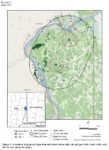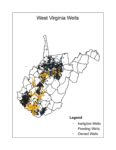For Release Sunday, June 24, 2018
Contact: David McMahon, (304) 415-4288, david@wvdavid.net
West Virginia’s 2018 mineral cotenancy statute is takes effect
Surface owners’ organization has explanations of effects on mineral and surface owners
(Charleston, WV) The Co-tenancy Modernization and Majority Protection Act which passed the 2018 West Virginia Legislature took effect June 3, 2018. It made big changes in oil and gas leasing and surface owners’ rights. Last week [June 19, 2018] the Oil and Gas Conservation Commission which has supervisory powers over the 2018 Co-tenancy Act declined to do any rule-making to help carry out or clarify the terms of the legislation.
Before the 2018 Cotenancy Act took effect, a driller had to get the signature of all of the owners of a mineral tract, no matter how many there were, before the driller could drill horizontally or otherwise into any mineral tract. And if there were unknown or unlocatable mineral owners, then the driller had to file a separate court action to have a lawyer appointed to represent them and sign a lease for them.
The 2018 Cotenancy Act changes that and does some other things. Now, if there are more than seven family members owning a mineral tract, the driller only has to get the owners of at least 75% of the ownership interest in the tract to sign leases before drilling. The remaining 25% can either elect, or stand silent and be deemed to elect, a de facto lease for the highest royalty and the average signing bonus contained in the leases of the owners of the 75% who did sign. The unsigned owners also get the best other terms included in any lease signed by one of those who did sign. Alternatively the 25% unsigned mineral owners can, instead of becoming de-facto lessors/royalty owners, elect to become working interest owners in the wells and have very different payments and other terms for involvement with the wells.
According to David McMahon, an attorney and co-founder of the West Virginia Surface Owners’ Rights Organization (WV-SORO), the statute also says that if the driller uses the new statute to put a well pad or other surface disturbance related to the development of a well on a surface owner’s land, then the surface owner’s consent is required. “That is a big deal for surface owners and they should learn about that, especially learning all the situations in which it applies. We have put materials on our website that explain that plus a number of other beneficial provisions for surface owners.” McMahon also said, “In addition, surface owners may eventually be able to get title to the minerals under them and future royalties if unknown and unlocatable mineral owners never show up.” McMahon said for that reason WV-SORO is advising surface owners to be wary if someone unexpectedly shows up where drilling is going on and wants to buy their surface – they may also be selling up the right to future royalties and some ownership interest in the minerals under them.
“The 2018 Cotenancy Act will definitely affect negotiations of leases from all mineral owners both before and after the drillers reach their 75% sign-up threshold,” McMahon said. “So people should be informed about that. About one-third of our members own their minerals so we have materials on our website about leasing also.”
McMahon said that signing contracts related to oil and gas drilling is not like signing papers to buy a car or to buy a house where most of the important provisions in the papers are dictated by decades of consumer protection laws and regulations. “Oil and gas papers are drafted only by the drillers’ lawyers. People need to see their own lawyer or at least educate themselves before signing anything.” He said that is especially true since the Oil and Gas Conservation Commission did not propose any rules that would result in surface or mineral owners being advised of their rights under the legislation.
To find the materials on the WV-SORO website go to www.wvsoro.org and scroll down to “Current Issues”.
### END ###









